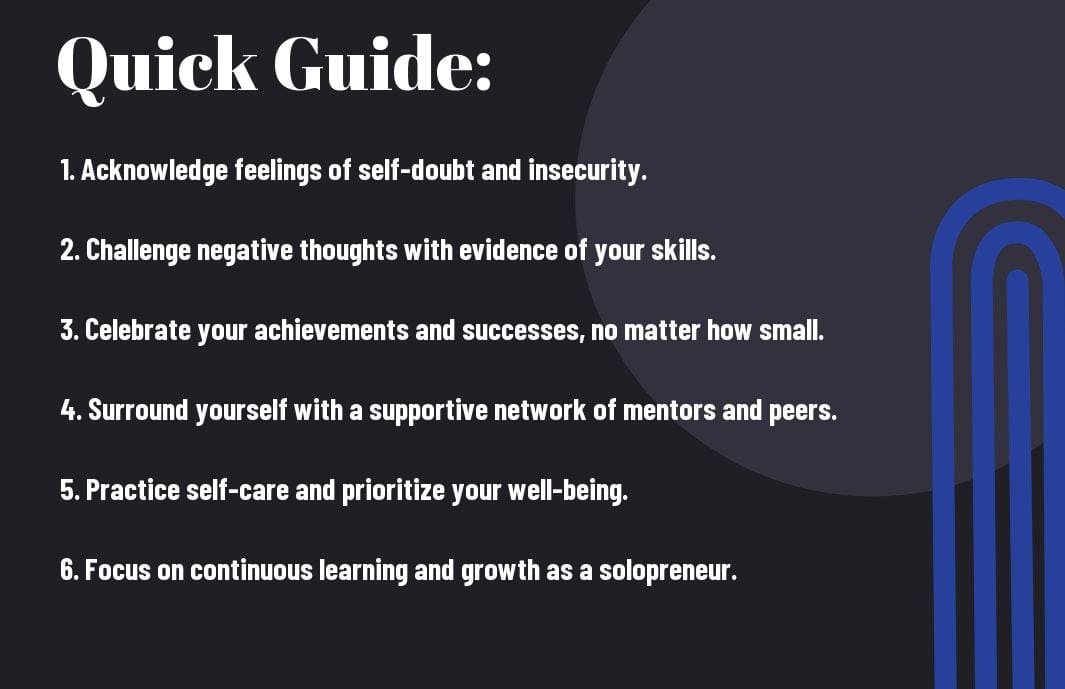Success as a solopreneur can be a daunting journey filled with challenges, and one of the most insidious of these obstacles is imposter syndrome. This psychological pattern can cripple your confidence, hinder your productivity, and limit your potential for growth. In this guide, we will examine into practical strategies and mindset shifts to help you overcome imposter syndrome and thrive as a solopreneur. By recognizing the signs, reframing your thoughts, and building self-confidence, you can unlock your true potential and achieve success on your terms.
Key Takeaways:
- Awareness is key: Recognizing and acknowledging imposter syndrome is the first step towards overcoming it. Understand that it is a common feeling that many solopreneurs experience.
- Focus on your accomplishments: Combat self-doubt by reminding yourself of your achievements and successes. Keep a record of positive feedback and accomplishments to boost your confidence.
- Seek support: Surround yourself with a strong support system of fellow solopreneurs, mentors, and friends who can offer encouragement and help you navigate through moments of doubt. Don’t be afraid to ask for help when needed.


Types of Imposter Syndrome
There’s a common misconception that imposter syndrome affects everyone the same way, but in reality, there are several different types of imposter syndrome that people may experience. Recognizing these different types can help individuals understand their thought patterns and behaviors better.
| The Perfectionist | The Superwoman/Superman |
| Achieving perfection in everything. | Feeling the need to excel in all roles. |
| Setting unrealistic goals for themselves. | Struggling to ask for help or delegate tasks. |
| Fearing failure and making mistakes. | Constantly feeling overwhelmed. |
| Overworking to avoid criticism. | Putting others’ needs before their own. |
| Seeking validation through achievement. | Difficulty saying no and setting boundaries. |
The Perfectionist
You may be a perfectionist if you find yourself obsessing over every detail, constantly seeking approval, and never feeling satisfied with your work. It’s important to remember that no one is perfect, and embracing imperfection can lead to greater growth and success.
The Superwoman/Superman
On the other hand, the superwoman/superman type of imposter syndrome involves feeling the need to excel in all areas of life – whether it be at work, home, or in personal relationships. This constant pressure to be perfect in every role can lead to burnout and feelings of inadequacy.
Types of imposter syndrome manifest differently in different people, but they all share a common thread of self-doubt and fear of being exposed as a fraud. One important step in overcoming imposter syndrome is recognizing which type resonates with you so that you can address it head-on.
The Natural Genius
One indicator of the natural genius type of imposter syndrome is the belief that success should come effortlessly and without any struggle. This mindset can lead to feelings of inadequacy when faced with challenges or setbacks, as it goes against the expectation of immediate mastery.
The Soloist
Another common type of imposter syndrome is the soloist, who believes that asking for help or working with others is a sign of weakness. This mindset can lead to isolation and a lack of collaboration, hindering personal and professional growth.
The Expert
While seeking knowledge and expertise is vital for success, the expert type of imposter syndrome involves feeling like you never know enough. This constant pursuit of knowledge can lead to a cycle of self-doubt and procrastination, preventing you from reaching your full potential.
Factors Contributing to Imposter Syndrome
For solopreneurs, Imposter Syndrome can be a significant roadblock to success. Understanding the factors that contribute to this phenomenon is crucial in overcoming it and thriving in your entrepreneurial journey.
Personal Factors
- Perfectionism: Setting unrealistically high standards for oneself.
- Self-doubt: Questioning one’s abilities and feeling inadequate.
- Comparing: Constantly comparing oneself to others and feeling inferior.
On a personal level, these factors can create a self-imposed pressure to constantly prove oneself, leading to feelings of inadequacy and self-doubt. Recognizing these patterns is the first step towards overcoming Imposter Syndrome and embracing your capabilities.
Professional Environment Factors
- Lack of recognition: Not receiving acknowledgement for achievements.
- High expectations: Pressure to perform at a consistently high level.
- Isolation: Feeling disconnected from support networks.
Personal challenges can be exacerbated by factors in the professional environment. When solopreneurs work in isolation without external validation or support, it can amplify feelings of inadequacy and self-doubt. Recognizing these external triggers is important in addressing Imposter Syndrome and building resilience in your entrepreneurial journey.
Understanding the personal and professional factors that contribute to Imposter Syndrome is crucial for solopreneurs. By recognizing these triggers and taking proactive steps to address them, you can cultivate a strong sense of self-worth and confidence in your abilities, paving the way for success in your entrepreneurial endeavors.
Step-by-Step Tips to Overcome Imposter Syndrome
All solopreneurs face challenges, and one common hurdle to success is imposter syndrome. This self-doubt can hold you back from reaching your full potential. To help you overcome imposter syndrome and thrive in your entrepreneurial journey, follow these step-by-step tips:
- Recognize Your Achievements
- Shift Your Mindset
- Build a Support System
- Develop Expertise and Skills
- Manage Perfectionism
Recognizing Your Achievements
Your accomplishments, big or small, deserve recognition. Take time to reflect on what you have achieved so far in your solopreneur journey. Celebrating your wins can help boost your confidence and remind you of your capabilities.
Shifting Your Mindset
It is vital to reframe your thinking and shift your mindset from self-doubt to self-belief. Rather than focusing on what you perceive as shortcomings, concentrate on your strengths and unique qualities that set you apart as a solopreneur.
Building a Support System
You do not have to navigate the challenges of solopreneurship alone. Surround yourself with like-minded individuals who understand your struggles and can provide valuable support and encouragement along the way.
Developing Expertise and Skills
Tips to grow your expertise and skills include continuous learning, seeking mentorship, and staying updated on industry trends. Enhancing your knowledge can boost your confidence and credibility in your field.
Managing Perfectionism
Shifting your focus from perfection to progress is key in managing imposter syndrome. Understand that mistakes are a natural part of growth, and striving for perfection can hinder your success as a solopreneur.
Pros and Cons of Battling Imposter Syndrome as a Solopreneur
Many solopreneurs face the challenge of imposter syndrome, a psychological pattern where individuals doubt their accomplishments and have a persistent fear of being exposed as a fraud. It can impact a solopreneur’s confidence, decision-making, and overall success. Let’s explore the pros and cons of battling imposter syndrome in the entrepreneurial world:
| Pros of Overcoming Imposter Syndrome | Cons and Potential Setbacks |
| Increased self-confidence | Higher levels of stress and anxiety |
| Improved focus and productivity | Fear of failure leading to missed opportunities |
| Better relationships with clients and partners | Difficulty in delegating tasks |
| Enhanced creativity and innovation | Imposter syndrome can hinder personal growth |
Pros of Overcoming Imposter Syndrome
Now, overcoming imposter syndrome as a solopreneur can lead to a myriad of benefits. Increased self-confidence can help you take on challenges with a more positive mindset, allowing you to showcase your true potential and expertise to clients and collaborators.
Cons and Potential Setbacks
Syndrome, battling imposter syndrome can also come with its own set of challenges. Constantly doubting your abilities can lead to heightened stress and anxiety, impacting your overall well-being and decision-making process. Additionally, the fear of failure may hold you back from taking calculated risks that could propel your business forward.
This is where self-awareness and seeking support from mentors or peers play a crucial role in navigating the hurdles associated with imposter syndrome. By addressing these challenges head-on, solopreneurs can cultivate a resilient mindset and thrive in their entrepreneurial journey.
FAQ
Q: What is Imposter Syndrome?
A: Imposter Syndrome is a psychological pattern where an individual doubts their accomplishments and has a persistent fear of being exposed as a “fraud,” despite evidence of their success.
Q: How does Imposter Syndrome affect solopreneurs?
A: Imposter Syndrome can be particularly challenging for solopreneurs, as they often work alone and may not have a support system to provide feedback and validation. This can lead to feelings of isolation and self-doubt, impacting their ability to succeed.
Q: How can solopreneurs overcome Imposter Syndrome?
A: Solopreneurs can overcome Imposter Syndrome by practicing self-compassion, setting realistic goals, seeking support from peers and mentors, and focusing on their strengths and achievements. It is also important for solopreneurs to acknowledge their successes and remind themselves that they deserve to be where they are.




